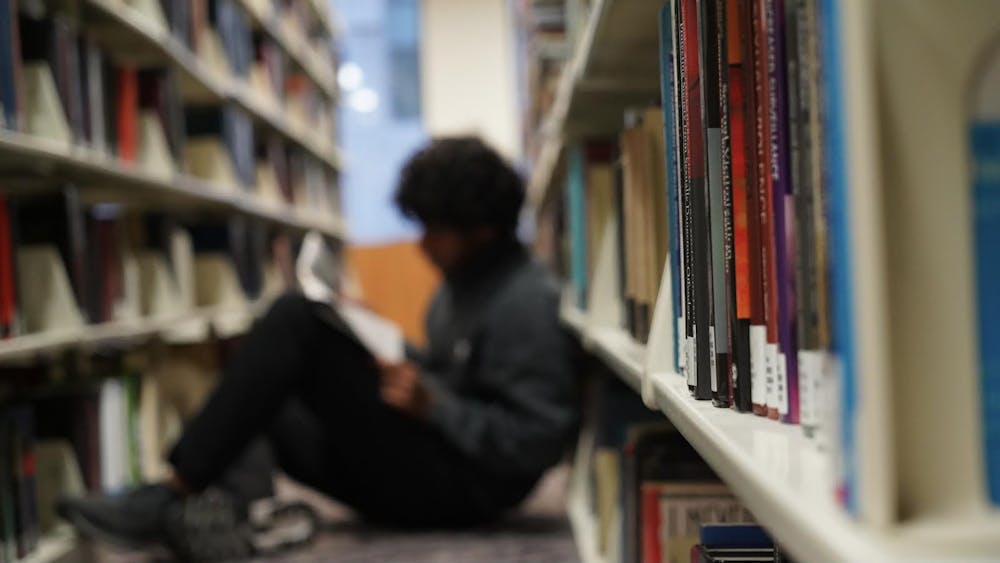Every college student has a small bookshelf that is slowly growing into a personal library of expensive textbooks, taking up valuable real estate. In fact, in the 2022-23 school year, the average college student spent about $285 on course materials yearly. But Course Reserves in Bender Library provides the necessary materials — for free.
What started out as a project in 2009 aiming to have all AU Core textbooks available for students has turned into a place where students can use thousands of resources, whether physical books or the ever-growing ebook database.
Today, the Course Reserves even has its own spot on the menu bar for each class’s Canvas page. The reserves are based out of a desk on the first floor of the Library, where students can take out textbooks for three-hour or one-day loans.
Donna Femenella, the course reserves manager, told The Eagle that the program “fundamentally kind of comes down to saving [student’s] money” while explaining the issue with current prices of textbooks.
“[Course Reserves understands] that the cost [of] textbooks is very high, and you might be just taking this course once and these textbooks might not be necessary for your long-term career,” Femenella said. She added that the library section has evolved since it “really shifted focus to electronic books” due to COVID.
“We just wanted to … provide as many options as we could,” Femenella said.
The reserves don’t only help students, according to Michelle Eller, the course reserves coordinator. Professors use the program to guarantee that “their students have some way of accessing their materials” for class.
“I think that the professors that use it, use it every year, and I think new faculty when they come and ask questions and realize what the service is, are very excited to use it,” Eller said. “But I also am understanding of the fact that it's a losing battle if you're trying to force somebody to change a way that they've been doing classes for a very long time.”
To get a book added to the reserve, professors can use the link within their class’s Course Reserves link or, along with students, can email the Course Reserves to request material. According to the Course Reserves website, e-books will be prioritized, but physical books can be added through currently shelved books or the Library will purchase the text. The only exception is materials from other schools, which cannot be put on reserve at AU.
As with all campus resources, some students use the reserves more than others, according to Eller.
“I think that students when they realize what it is, do use it,” Eller said. “And other students who realize that Course Reserves exist as an option and are kind of converted to the ‘cult’ of course reserves are like, ‘Oh, my gosh, this is amazing. I didn't even know this was a service that we offer.’”
Brooke Bulger, a senior in the School of Public Affairs and the College of Arts and Sciences, explained that she felt using the Course Reserves helped her early in her academic career, using the reserves weekly to complete a Justice, Law and Criminology course with a required textbook.
“It was definitely nice not having to worry about buying textbooks, especially ones that I know I'm going to use super often,” Bulger said. She added her “love” for the people who worked at the reserves, saying, “Thank you librarians.”
When asked what the reserve may look like in the next 10 years, Femenella said they are prepared to shift in any direction to help students. Course Reserves has already helped students save their money in the past 15 years, and plans on continuing and improving that aid. Next semester’s increase to a one-day loaning period for all physical materials will replace the current policy that requires certain materials back within three hours.
“I hope that we keep adapting with how students are … reading or wanting to get access to materials and stuff like that,” Femenella said, whether that be physical or electronic books. “My hope is that we stay in line with what students seem to be wanting.”
This article was edited by Abigail Hatting, Tyler Davis and Abigail Turner. Copy editing done by Luna Jinks, Isabelle Kravis, Ariana Kavoossi and Sydney Kornmeyer.
features@theeagleonline.com





